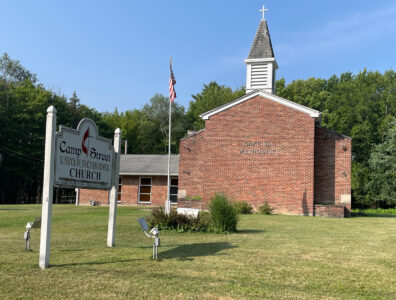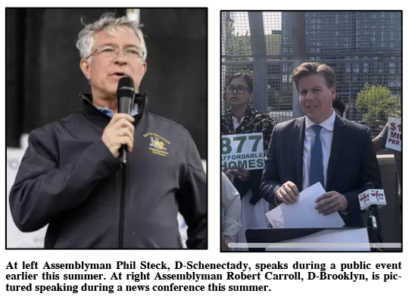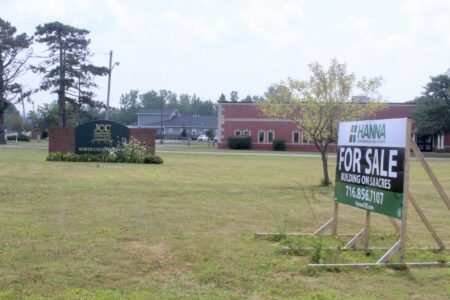State Poised To End Free Natural Gas Hookups

Assemblyman Andrew Molitor is pictured during a recent news conference as Republicans criticized the state Legislature’s repeal of the 100-foot rule for new natural gas hookups. Pending Gov. Kathy Hochul’s approval, utility companies will be required to charge for new natural gas hookups if the new development or home is within 100 feet of an existing natural gas line.
New York isn’t banning the use of natural gas in new construction yet, but the state Legislature has taken action to make new natural gas hookups more expensive.
Both houses of the legislature passed legislation (A.8888/S.8417) that repeal the state’s 1986 legislation barring utility companies from charging for new natural gas hookups if the new development or home is within 100 feet of an existing natural gas line. The reasoning for the 1986 rule was to encourage natural gas hookups for those who were using home heating oil or coal to heat their homes or buildings. Now, Democrats in the state Legislature are trying the same tactic in an attempt to discourage natural gas hookups while boosting the use of electricity in new construction rather than natural gas.
Assemblywoman Jo Ann Simon, D-Brooklyn, and other Assembly Democrats said during floor debate on the legislation that the bill will save ratepayers who have been subsidizing the hookups with rate increases over the years.
“This bill ends New York state’s 100-foot rule, which saves hardworking New Yorkers $200 million a year,” she said. “The bill does not prevent new gas hookups. It simply means that everyone else won’t be forced to pay $200 million a year to hook up new customers and line the pockets of utility shareholders. Currently hooking up to gas is not free, it’s paid for by everybody else. No one is taking your gas away. The inconvenient truth is in fact the truth, however inconvenient. This will simply incentivize hookups to electric and heat pumps, which are more reliable, less expensive and better for health and the environment.”
The bill was a last-minute to the legislative agenda as this year’s session came to a close as it became evident there wasn’t enough support for the NY Heat Act, a broader piece of legislation that also included repealing the 100-foot rule. Assemblyman Angelo Morinello, R-Niagara Falls, criticized the effort to say the 100-foot rule should be repealed to save ratepayers money. He called attention to the myriad of hidden fees and surcharges that are lumped into a customer’s utility bill. On a Jamestown BPU bill, the charge is seen as a fuel adjustment charge, and can often be nearly as much as the energy charge on an electric bill. Those charges are often a state-required charge that raises money for buildout of an all-electric grid. Legislation that would allow utility companies to itemize fuel adjustment or transportation charges has never made it out of legislative committees.
“Let’s take your electric bills, and I’m going to ask everyone in this chamber, when they go home, look at your electric bill,” Morinello said. “Look at the transportation and surcharges in some instances are 70% of your total electric bill and when you inquire what it’s for, it’s to build out the electric grid. So the concept that the first 100 feet is going to save taxpayers money doesn’t hold up if you compare it to the goal of all electric. When you look at that electric bill, you realize every single electric rate payer in this state is subsidizing a buildout for the lofty goals of this particular state. So if we’re going to do that, then why don’t we become transparent on the transportation in surcharges on our electric bills?”
A.8888 passed the state Assembly in an 86-62 vote, largely along party lines but with some Democrats voting against it. Assemblyman Joe Sempolinski, R-Canisteo, and Andrew Molitor, R-Westfield, both voted against, as did Sen. George Borrello, R-Sunset Bay, when the Senate passed S.8417 by a 34-25 vote.
Molitor warned that local manufacturers and small businesses could be harmed by the proposal since they could face higher costs to connect to natural gas if they so choose. The proposed changes could severely impact operations at Chautauqua County’s industrial plants, food processors and agricultural operations that rely on natural gas for consistent, cost-effective energy.
“This isn’t just bad policy, it’s bad policy aimed at the wrong people,” Molitor concluded. “Let’s stop punishing the people who heat their homes responsibly and start crafting energy solutions that reflect the realities of rural New York.”
Borrello, meanwhile, criticized the bill as part of his end-of-session statement to the media.
“Democrats also pressed ahead with their reckless energy agenda,” Borrello said. “They passed a rebranded version of the so-called ‘Heat Act,’ which still aims to dismantle our affordable natural gas system, ignoring the fact it will raise utility bills, decrease reliability and deliver no measurable climate benefit. This came even as New York’s independent system operator warned of a looming energy reliability crisis due to the irresponsible shuttering of reliable energy producing plants, like the Dunkirk NRG plant.”



